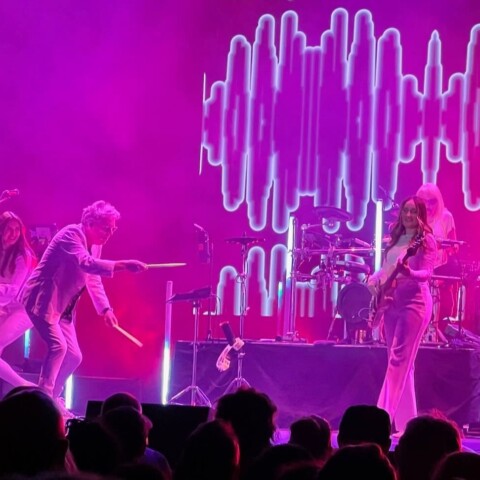THIS WEEK ACROSS TIME – Tales From Topographic Osbournes
 DID YOU KNOW there’s always been a Grammy award for Best Album Notes? It refers to sleeve and insert text, not music. Shame that. I wonder how the results of a Best Music Notes category would’ve looked all these years in comparison to the payola sales schmooze of Best Album, Best Single, etc. What would the criteria be? And how would the sub-categories break down? Best New Semi-Quaver? Dischord Of The Year?
DID YOU KNOW there’s always been a Grammy award for Best Album Notes? It refers to sleeve and insert text, not music. Shame that. I wonder how the results of a Best Music Notes category would’ve looked all these years in comparison to the payola sales schmooze of Best Album, Best Single, etc. What would the criteria be? And how would the sub-categories break down? Best New Semi-Quaver? Dischord Of The Year?
Who knows. But maybe, just maybe, a double vinyl dose like Yes’s 1973 epic, Tales From Topographic Oceans, would’ve held on to more critical praise than its reputation has managed to maintain for it over the ensuing decades. History seems to have forgotten The Times newspaper’s 1974 prediction in reference to album track, ‘The Ancient’, that it “will be studied 25 years hence as a turning point in modern music”. But the music had a difficult personality and was only sparsely populated by truly effective moments compared to the band’s previous work. And these weren’t the shortest pieces ever collected in one place either, even by Yes’s standards. I’d imagine at the vinyl mastering session that bass would’ve been at a premium.
These terrible twins were delivered oversized from Roger Dean’s gorgeous gatefold after a difficult pregnancy, in the second December week of 1973. Following the conception of vocalist Jon Anderson’s reading of a footnote from Yogananda’s Autobiography Of A Yogi, gestation began peacefully, on tour. Anderson and guitarist Steve Howe holed up in hotel rooms indulging in candlelit writing sessions, devising basic structures and lyrics wrought from Shastra scripture for the four songs based in thousands of years of divine knowledge brought clearly forth from the 100-word footnote of a Rider paperback from 1969.
 Eventually, the tour came to an end. So rather than regulate these creatively successful meetings out numerologically or to every Halloween and Shrove Tuesday, Jon, Steve and the rest of the band gave the collective affirmative to the more convenient installation of wooden fences, hay bails, a barn and a model cow with electronic udders in the London-based recording studio. This was to give a rural feel and aesthetically accompany the laying down of movements punctuating the oceanic topography of their magnum opus.
Eventually, the tour came to an end. So rather than regulate these creatively successful meetings out numerologically or to every Halloween and Shrove Tuesday, Jon, Steve and the rest of the band gave the collective affirmative to the more convenient installation of wooden fences, hay bails, a barn and a model cow with electronic udders in the London-based recording studio. This was to give a rural feel and aesthetically accompany the laying down of movements punctuating the oceanic topography of their magnum opus.
But paradise didn’t stay. Keyboardist Rick Wakeman, frustrated with proceedings, saw a calm blue ocean and took a zen attitude over to the neighbouring studio to hang with Ozzy Osbourne and Black Sabbath and kick back, drinking beer and playing darts. Admirable. While Yes, now reduced to a quartet, continued the work of struggling with the obese love twins next door.
 Wakeman’s time with the Sabbath was smooth and easy-going, with the Prince of Darkness even pulling a few all-dayers in order to accommodate the great caped one. And despite everything, relations were also friendly whenever Wakeman poked his head back around the Yes studio door with Ozzy in tow. Rick sacrificed recording time with Yes in order to hang with and play for the Sabbath, and thankfully, due to continued professionalism and a level of maturity, he and Ozzy’s friendly beer-fueled banter fell short of any musical argument, or indeed disagreement over who out of Merlin the Magician and Aleister Crowley might win at arm wrestling.
Wakeman’s time with the Sabbath was smooth and easy-going, with the Prince of Darkness even pulling a few all-dayers in order to accommodate the great caped one. And despite everything, relations were also friendly whenever Wakeman poked his head back around the Yes studio door with Ozzy in tow. Rick sacrificed recording time with Yes in order to hang with and play for the Sabbath, and thankfully, due to continued professionalism and a level of maturity, he and Ozzy’s friendly beer-fueled banter fell short of any musical argument, or indeed disagreement over who out of Merlin the Magician and Aleister Crowley might win at arm wrestling.
 In the end, Rick contributed little to the Yes project, which I’d think of as an act of professional respect. When someone finds it difficult to get on board with someone else’s vision, better to leave them to it than walk all over it. Someone did something right because the double album was a success upon release. It reached No. 1 in the UK and No. 6 in the USA, pipped there by Wakeman’s solo Journey To The Centre Of The Earth which got to No. 3. That album made the Billboard Top 50 albums the following year, but mysteriously, Tales From Topographic Oceans was absent from the list.
In the end, Rick contributed little to the Yes project, which I’d think of as an act of professional respect. When someone finds it difficult to get on board with someone else’s vision, better to leave them to it than walk all over it. Someone did something right because the double album was a success upon release. It reached No. 1 in the UK and No. 6 in the USA, pipped there by Wakeman’s solo Journey To The Centre Of The Earth which got to No. 3. That album made the Billboard Top 50 albums the following year, but mysteriously, Tales From Topographic Oceans was absent from the list.
Why would that be? The record certainly received some critical flak. One popular criticism was of the padding of the four songs out to an album side each. Sections were lengthy yes, but highlighted by some quite accessible melodies in places along with interesting musical references to earlier Yes work such as Close To The Edge. For the converted I suppose. Like an ocean, the horizontal co-ordinate system of this double album was vast and seemingly endless. I guess that was the point, but I’ve had 15-hour flights that felt shorter than Tales From Topographic Oceans. Unfortunately, but fittingly for the concept at least, like an ocean floor, the album’s high points did end up rarer than its low ones.
 And as if in a fit of nostalgia for his observations of the recording sessions, virtually to the day of the album’s 20th anniversary in 1993, Ozzy Osbourne celebrated on his ride-on mower by breaking his collarbone and eight ribs in an attempt to scale the topographics of his English estate. Surely the record deserved an award for Best Musical Notes by then, at least in its English homeland. At the February 1994 Brit Awards, host Elton John could’ve easily given Yes a statuette for their historic troubles, and held an extra one in sympathy for the recovering Ozzy: Best Vertically Reversed Terrain Vehicle. PETER KEARNS
And as if in a fit of nostalgia for his observations of the recording sessions, virtually to the day of the album’s 20th anniversary in 1993, Ozzy Osbourne celebrated on his ride-on mower by breaking his collarbone and eight ribs in an attempt to scale the topographics of his English estate. Surely the record deserved an award for Best Musical Notes by then, at least in its English homeland. At the February 1994 Brit Awards, host Elton John could’ve easily given Yes a statuette for their historic troubles, and held an extra one in sympathy for the recovering Ozzy: Best Vertically Reversed Terrain Vehicle. PETER KEARNS
















I think this album and Jethro Tulls Passion Play, showed just how self indulgent Prog rock had become by 73-74. i struggled to play either album in their entirety when i brought them in the late 70’s. I have just been given a box set of Yes’s Atlantic recordings by santa, so will give the Tales, another go after 35 years. The wife and daughter, are insistent i only play the Yes box set on my car stereo!!
I notice neither band plays songs from those albums on tour. Hopefully hidden in the “seemed a good idea at the time” cupboard.